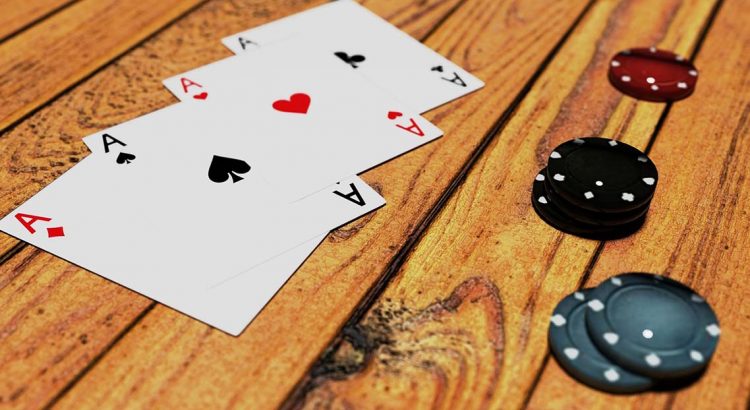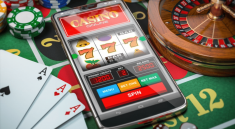A casino is a place where you can lose it all. But if you’re smart, you know how to take advantage of the casino’s tricks and win back what you’ve lost.
A new study by researchers at Cornell University found that gamblers who are aware of these tactics spend more money than those who aren’t. The findings were published in the journal Psychological Science.
The study was conducted by psychology professor David Rucker, psychology professor Elizabeth Dunn and graduate student Ryan Sallans. They recruited a group of gamblers from the same university campus in Ithaca, New York, and divided them into two groups. One group was provided with information about the ways casinos try to manipulate people into spending more money. The other group didn’t receive any such information. Both groups then played simulated slot machines in a lab for six hours. Their results showed that people who received this information spent nearly three times as much as those who didn’t.
Rucker told us that the purpose of the study was not to discourage people from gambling but rather to find out whether they might be able to learn to spot and avoid the tactics casinos use to exploit their own customers. “We wanted to know if we could teach them something,” he said.
Here are nine casino tricks that gamblers should be on the lookout for.

- Casino games offer players incentives to play longer
Casinos want you to play as long as possible because the longer you stay, the higher they make the jackpot. This is why some slot machines have “bonus rounds” or “super spins.” There may also be bonus features like free spins that give you additional chances to earn points and win prizes during gameplay. But these bonuses don’t last forever. After a certain number of minutes or spins, the bonuses end and you’ll have to start over again from scratch.
- Casinos lure you into playing with real money
When you first sit down at a slot machine, the game will ask you if you’d like to bet with real money. You may think that the only way to win is to put up your entire bankroll and hope for the best. While this tactic does work, it’s often risky.
The average house edge on slots (the percentage of money you lose when you play) is around 3 percent. That means if you play $100 per spin and win, you’ll net $100 after accounting for the casino’s cut. If you end up losing that same amount, you’ll lose your entire investment. And if you lose more, you risk leaving empty-handed. In fact, according to the Federal Trade Commission, Americans lost an estimated $4 billion last year playing slot machines.
- Casinos encourage you to gamble more by offering you comps
When you win, casinos often reward you with a free meal, a gift certificate for clothes, or cash. These perks are called comps. Most casinos offer different amounts of comps based upon how much you play. For example, a player who plays $10 each week might qualify for one meal ticket while a gambler who spends $20 every single day gets two.
These rewards seem like great deals — until you realize that you need to gamble a lot just to get enough comps to eat lunch once. On top of that, many casinos limit the number of comps you can redeem at a time. So even though you may feel like you deserve them, you won’t actually get the full value of the comp.
If you see yourself getting hooked on comps, consider playing slot machines instead. Slot machines have no built-in comp system, so you never have to worry about running out of rewards. In addition, most casinos offer a variety of deposit methods, which makes it easy to save up and quit before you run out of options.
- Casinos tempt you with big wins
Casinos love to tell stories of people winning millions. It keeps you coming back. But you need to remember that these wins are almost always exaggerated. In fact, you have no more chance of walking away with $10 million than you do of finding a $100 bill under the mattress.
- Casinos use psychological techniques to keep you spending
In his book, A Mind for Numbers, Daniel Kahneman explains one of the most common psychological techniques used against consumers. When he went shopping for a new refrigerator, for instance, he noticed that salespeople would point out the features of the model he was looking at. At the same time, however, the salesperson wasn’t making eye contact or answering questions. As he tells it:
I felt myself being drawn in, and then an internal voice began to chide me: “Don’t fall for that! The salesman is trying to distract you so that you’ll buy the model he has in mind without thinking too hard about it. Don’t listen to him; look past the shiny appliance and concentrate on the price.”
Kahneman says that it worked. He bought the fridge.
One thing to keep in mind is that there are two components to persuasion. The first component is that of cognitive dissonance, which refers to the discomfort experienced when someone changes their beliefs or opinions. Cognitive dissonance can cause people to do irrational things, including buying products that they don’t really want. But if you’re trying to figure out if you’ve been manipulated, you probably shouldn’t focus on cognitive dissonance. Instead, you should look to see if your decision-making process involved a lot of rational thought. If it did, you probably weren’t swayed by the sales pitch.
- Casinos use the “pile effect” to convince you to spend more
The “pile effect” is a psychological trick that casinos use to convince you to spend more. According to psychologist Paul Slovic, the pile effect works like this: When you see a stack of chips, you automatically assume that there’s a high probability that the pile contains a large sum. Because of this, you tend to overestimate its size.
- Casinos try to turn you into a slave driver
Sometimes you might notice that you’re playing slot machines and suddenly realize that you’ve been playing for hours. You haven’t eaten, you’re tired, and you still haven’t hit any wins. What happened?
According to the National Center for Health Statistics, the average adult loses $200 a year to gambling. Some of that loss is due to comps, but a good chunk of it comes from playing slot machines. In fact, the average American loses $5.8 billion in annual losses to gambling.
This is why casinos try to get you addicted to playing. They want you to come back in order to make money. They don’t care if you win or lose. All they want is your money.

- Casinos try to make you feel guilty for wasting your money
If you lose a few bucks playing a slot machine, there’s a good chance that a casino representative will show up at your table and talk to you about it. Sometimes, they’ll even offer to pay you back or let you off the hook with a free meal. But you should beware of these kinds of offers. If you ever go to a casino to play blackjack, for example, you can expect to be offered comp cards. These cards are similar to comps, except that they don’t have to be redeemed within a set amount of time. They can be redeemed whenever you want.
Many people are tempted to accept comp cards, especially if they’re feeling bad about blowing through their budget. But accepting a comp card doesn’t help you recover from a poor financial decision. In fact, it’s likely to prolong your poor behavior.
- Casinos use food to lure you in
If you go to a casino, there’s a good chance that you’ll be offered free food. You might feel tempted to accept, especially if you’re hungry. But there’s another reason why casinos offer free meals. They know that you’ll feel uncomfortable eating alone in a restaurant, so they provide a distraction.
You might wonder why a casino wouldn’t offer free food for everyone. Why would anyone want a captive audience? Well, there’s a simple answer: They don’t.
A person should in general keep these basic tips in mind when they choose the platform to play the casino game. Most of the people rely on Judi Bola Online as it provides quality of services to the people. A person should always remain active to play the game of their choice of the platform.
Casinos want to keep you coming back. That’s why they offer free food, free drinks, and free entertainment. They want to get you to spend money. But before you leave, take a second to reflect on what you’ve gained from your visit. Did you learn anything? Were you entertained? Did you enjoy yourself?




